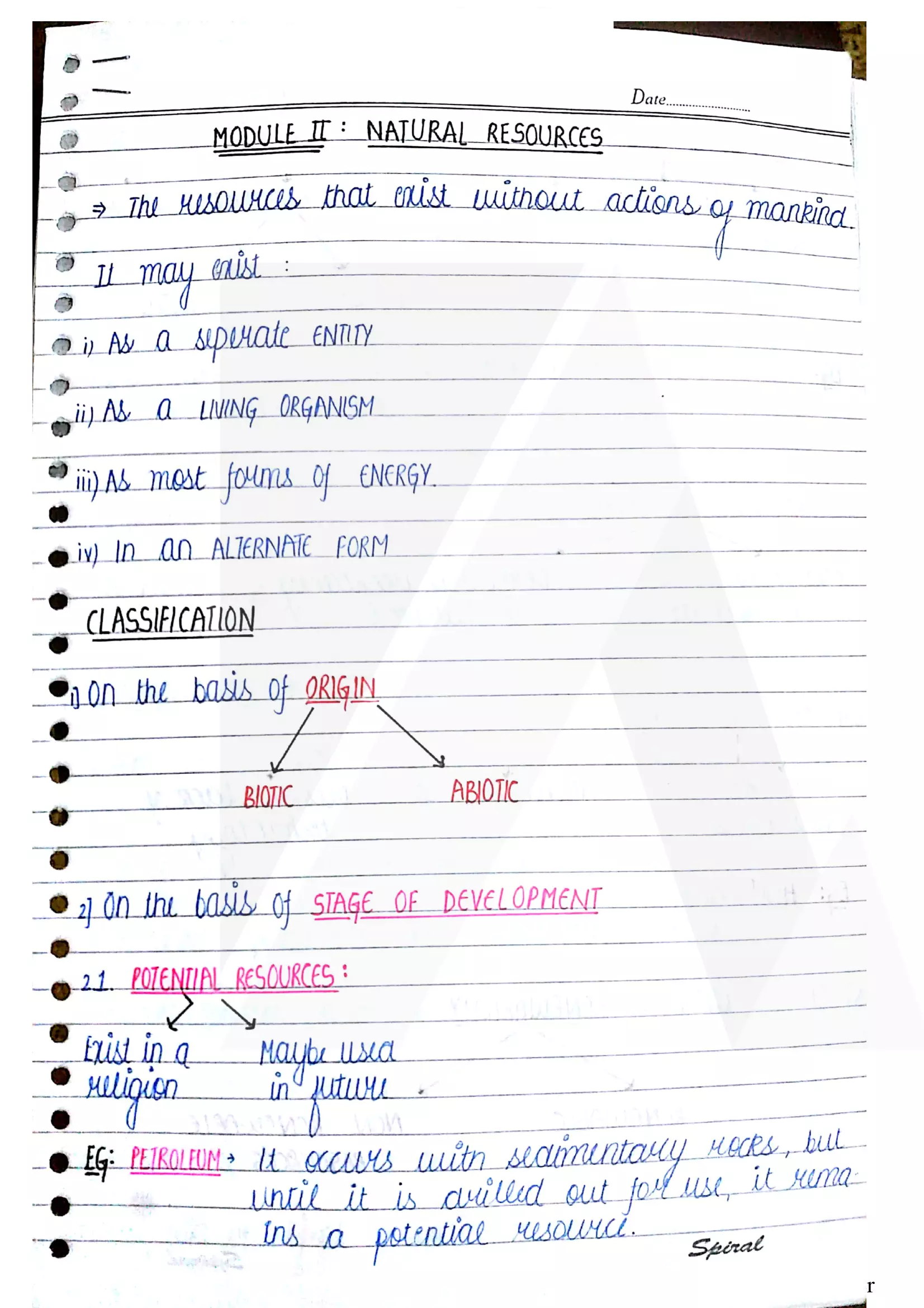Natural Resources BCA Notes
Natural Resources BCA Notes : This article contains BCA Environmental Studies Subject Unit 2 Natural Resources BCA Notes. this is very helpful for BCA students. please share this article with your all friends and all groups. and all notes are available on this website.
Quick Links:
Understanding natural resources is crucial within the context of a Bachelor of Computer Applications (BCA) program as it involves the sustainable management and utilization of Earth’s finite resources. Natural resources encompass renewable and non-renewable materials and energy sources that are essential for human survival and economic development. In this exploration, we’ll delve into the concept of natural resources, their types, challenges, conservation strategies, and the role of technology in resource management.
What are Natural Resources?
Natural resources are materials or substances found in the environment that are valuable to humans for economic and societal development. These resources can be categorized into several types:
- Renewable Resources:
- Biological Renewable Resources: Include living organisms like forests, fisheries, and agricultural crops that can regenerate if managed sustainably.
- Non-biological Renewable Resources: Include renewable energy sources such as solar, wind, hydropower, and geothermal energy.
- Non-renewable Resources:
- Include minerals (e.g., metals, ores), fossil fuels (e.g., coal, oil, natural gas), and groundwater reserves that are finite and depletable over time.
- Ecosystem Services:
- Natural processes and functions provided by ecosystems, such as pollination, water purification, climate regulation, and soil fertility, which support human well-being.
Importance and Challenges of Natural Resources
Natural resources are essential for economic growth, industrial development, and meeting basic human needs. However, their exploitation and utilization pose several challenges:
- Environmental Degradation: Unsustainable extraction and use of natural resources can lead to habitat destruction, biodiversity loss, and pollution of air, water, and soil.
- Resource Depletion: Non-renewable resources can be depleted faster than they can be replenished, leading to scarcity and potential conflicts over access to resources.
- Climate Change: The extraction and combustion of fossil fuels contribute to greenhouse gas emissions, exacerbating climate change impacts like global warming and extreme weather events.
Conservation and Sustainable Management Strategies
Effective conservation and sustainable management of natural resources involve:
- Resource Efficiency and Circular Economy:
- Promoting resource-efficient practices in industries and businesses to minimize waste generation, optimize resource use, and promote recycling and reuse.
- Ecosystem-Based Management:
- Protecting and restoring ecosystems that provide critical services (e.g., forests, wetlands) to maintain biodiversity, regulate climate, and support sustainable livelihoods.
- Policy and Governance:
- Implementing regulations, incentives, and international agreements (e.g., Paris Agreement on climate change, Convention on Biological Diversity) to promote sustainable resource management and conservation.
- Technological Innovation:
- Developing and deploying advanced technologies for resource exploration, extraction, and utilization that minimize environmental impacts and maximize efficiency.
- Utilizing digital technologies (e.g., IoT, AI, blockchain) for monitoring and managing natural resources, enhancing transparency, and supporting sustainable practices.
Role of Technology in Natural Resource Management and BCA
Incorporating natural resource management into the BCA curriculum allows students to explore how technology can contribute to sustainable development:
- Data Analytics and Predictive Modeling:
- Using big data analytics and machine learning algorithms to analyze geospatial data, predict resource availability, and optimize resource extraction processes.
- Remote Sensing and GIS:
- Employing satellite imagery, drones, and Geographic Information Systems (GIS) for mapping and monitoring natural resource distribution, land use changes, and environmental impacts.
- Smart Technologies and IoT:
- Implementing IoT devices for real-time monitoring of resource extraction activities, environmental conditions, and compliance with regulatory standards.
- Blockchain Technology:
- Utilizing blockchain for transparent and secure tracking of resource supply chains, ensuring ethical sourcing and reducing illegal extraction and trade.
Applications and Case Studies
- Case Study: Renewable Energy Integration:
- Using predictive modeling to assess optimal locations for solar and wind farms based on resource availability and environmental suitability.
- Developing smart grids and energy storage solutions to enhance the reliability and efficiency of renewable energy systems.
- Case Study: Sustainable Agriculture:
- Applying precision agriculture techniques and sensor technologies to optimize water use, reduce pesticide application, and improve soil health.
- Using data analytics to predict crop yields and support farmers in making informed decisions about resource management.
- Case Study: Mining and Mineral Extraction:
- Implementing AI-driven systems for mine planning and rehabilitation, minimizing environmental impacts and promoting reclamation of disturbed landscapes.
- Monitoring groundwater and surface water quality using sensor networks to mitigate pollution from mining activities.
Career Opportunities in Natural Resource Informatics
BCA graduates interested in natural resources can pursue diverse career paths:
- Resource Data Analyst: Analyzing geological and environmental data, conducting spatial analysis, and modeling resource availability for mining and energy sectors.
- Environmental Software Developer: Designing software applications for environmental monitoring, GIS analysis, and regulatory compliance in natural resource industries.
- Sustainability Consultant: Advising businesses and government agencies on integrating sustainable practices into resource management strategies and environmental policy.
- IoT Solutions Architect: Developing IoT solutions for monitoring and optimizing resource extraction, environmental impact assessment, and compliance with sustainability standards.
Natural Resources BCA Notes

|
|
|||